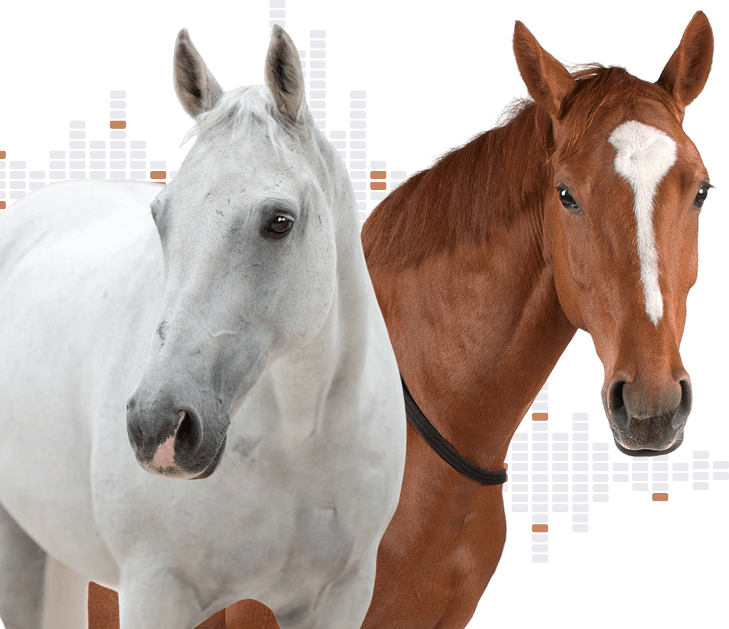Horses
Leopard Complex and Eye Health Issues
The leopard complex is a group of white spotting patterns, including the leopard, few-spot leopard, snowcap blanket, lace blanket, spotted blanket, varnish roan, snowflake, and frosted, speckled, and mottled patterns. They are caused by a mutation in the TRPM1 gene, which is inherited in an incomplete dominant fashion. Other genes also affect the final appearance of the horse’s coat, mainly regarding the extent of white, as patterns of the leopard complex can range from just a few white spots on the rump to an almost entirely white coat. This colouring is probably most associated with Appaloosas, but it can also be found in other breeds, such as the Knapstrupper, Noriker, and American Miniature Horse.
The incomplete mode of inheritance means that the horses that are heterozygous in the TRPM1 gene (LP/lp) are of a different colour than horses carrying two copies of the mutation (LP/LP). Heterozygous horses have typical spotting within the white areas of their body, while homozygous horses usually have none.
Sadly, the mutation responsible for the white spotting is also connected to eye health issues, the first one being Congenital Stationary Night Blindness (CSNB). As the name suggests, it’s a congenital non-progressive disorder, affecting only horses with two copies of the mutation (LP/LP). Affected horses appear to be able to see normally during daylight, but struggle with orientation in low-light conditions. It’s necessary to mention that most studies linking the TRPM1 mutation to CSNB have been conducted on Appaloosas, and it is likely that this single disease may be caused by different mutations across the horse population.
Another eye health issue linked to the leopard complex is Equine Recurrent Uveitis (ERU), also known as moon blindness. ERU is the most common cause of blindness in horses with a complex and multifactorial origin. It’s an autoimmune disease associated with genetic and environmental factors, as well as with Leptospiral infection. A study in the Appaloosa horse population found that LP/LP horses were at a greater risk for ERU, and the manifestation and severity of the disease were more significant compared to horses with just one copy of the mutation. LP/lp horses were found not to be at a significant risk for ERU compared to horses not carrying the mutation for the leopard complex (lp/lp).
The genetics behind leopard complex patterns inevitably involve health risks that need to be taken into consideration regarding breeding white spotted horses. Whole genome sequencing may offer you an interesting point of view, not only to potentially identify the TRPM1 mutation, but also to identify other genetic variants that may affect both coat colour and health of your horse. Your horse’s genome may even become an important piece of a puzzle for better understanding genetic aspects of eye health in horses, as mutations behind CSNB are not yet fully understood! Through community efforts, we can advance our knowledge of genetic causes of different equine disorders – everyone who has their horse WGS done contributes to uncovering the causes of not only CSNB, but also every disease waiting to be described!
make your order
Order online
our process
How does it work?
Take a few steps only to uncover your horse's DNA traits and learn more about his or her health and performance markers.


Select and Submit
Take charge of your genetic exploration journey by selecting the count of horses to be analyzed and any desired optional extras. Submit your order and expect a prompt response from our team.

Receive a Collection Package
We will deliver a package directly to your doorstep. It contains everything needed for a trouble-free blood sample collection by your veterinarian. After collecting the blood sample, simply send it back to us within 24 hours following the instructions you will also receive from us.

DNA Analysis Unveiled
We will isolate the genomic DNA of your horse from the sent blood sample. In our state-of-the-art laboratory, we will perform a whole genome DNA sequencing revealing the complex genetic information of your beloved horse.

Exclusive Data Delivery to Your Hands
We ensure the utmost privacy and exclusivity as we courier all the invaluable data and meticulously crafted reports directly to your hands. Of course, we remain at your disposal in case of questions!

EquineTest Online Storage
Once a year, if you wish, we will update your horse’s DNA sequencing report to reflect the current knowledge of horse’s markers of interest. Please notice there is a fast development in this field and considering the age and expected lifetime of your horse it may be worth to run this update service regularly. It will allow you to keep up with the latest scientific findings which are carefully monitored and implemented into our reports by our team of specialists.
what people say
Testimonials
get in touch
Contact us
![]()
We are located in the Czech Republic
Equinetest is a part of SEQme, a sequencing service provider since 2012.

SEQme s.r.o., Dlouha 176, 263 01 Dobris
(+420) 602 102 790 or (+420) 608 617 352 hello@equinetest.com

 Heidelberg, Germany
Heidelberg, Germany Budweis, Czech Republic
Budweis, Czech Republic Kuwait City, Kuwait
Kuwait City, Kuwait Göteborg, Sweden
Göteborg, Sweden